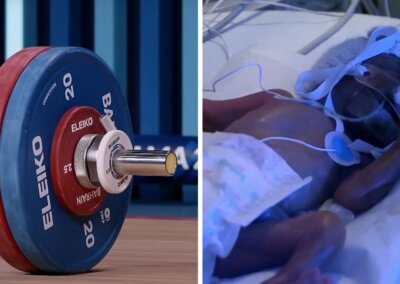Parents from Salisbury were in “absolute shock” as their baby girl was born nine weeks early on Christmas day, weighing just 2.12lb.
Charlotte Jewell and Dennis King were expecting their baby Payton to be born in late February, but Charlotte was admitted to hospital on 20 December as there were concerns that her daughter was not growing properly.
Charlotte was diagnosed with preeclampsia and she was told on Christmas Eve at a growth scan that she would need an emergency caesarean section.
Payton was born at 11:04 on Christmas morning. Her father Dennis reported that she had to be transferred to Princess Anne Hospital in Southampton for a “short blip”, but she returned to Salisbury Hospital afterwards where she was “doing great”.
“It was a complete shock, we weren’t ready”, he said. “We were going to go out and get everything this month but it’s a bit late for that now”.
With a birth weight of just 2.12lb, reports say that Payton was the smallest baby born that Christmas day in Salisbury.
Medical research has led to an improved understanding of life before birth
Just as medical advancements enabled doctors to recognise Charlotte’s preeclampsia and ensure that Payton could be born safely, much more is now known about the changes that unborn children undergo while in the womb. By 24 weeks gestation, the current gestational limit for abortion, the baby has already been fully formed for 12 weeks.
At 12 weeks gestation (the most common abortion time limit among countries in the EU), the NHS outlines that the unborn baby is fully formed. All the organs, muscles, limbs and bones are in place, and the sex organs are well developed. From then on, the baby just has to grow and mature.
At around 15 weeks gestation, the unborn baby will start to hear – they may hear muted sounds from the outside world, as well as the sound of their mother’s voice and heart. At 18 weeks gestation, the unborn baby may respond to loud noises from the outside world, such as music. At 23 weeks gestation, the unborn baby’s lungs are practising breathing movements to prepare for life outside the womb.
Spokesperson for Right To Life UK, Catherine Robinson, said “What a lovely story about an unexpected arrival on Christmas Day! It is wonderful to hear that baby Payton is doing well”.












